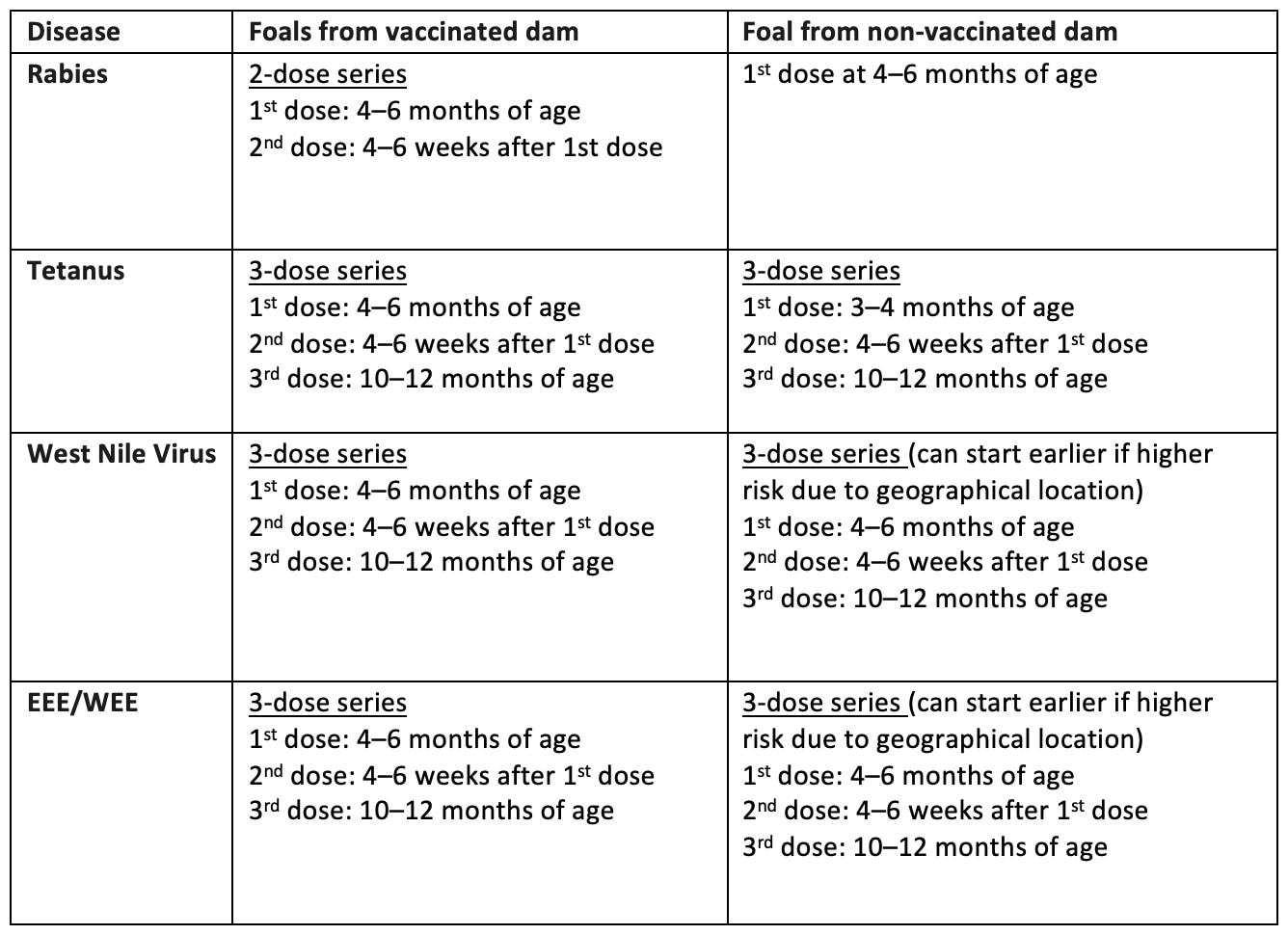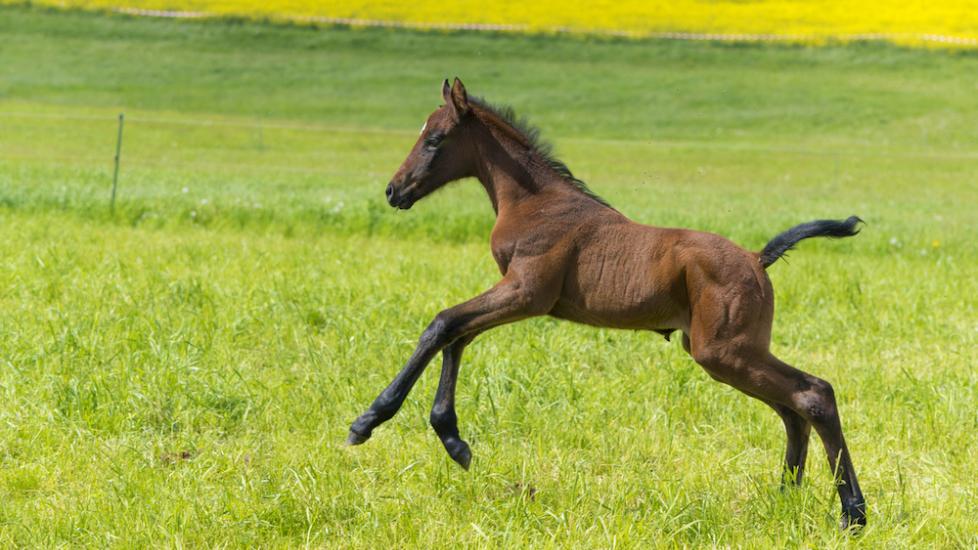Foal Vaccines: Everything You Need To Know
Do Foals Need Vaccines?
Newborn foals get protection from disease through antibodies in mare’s milk, if the mare was vaccinated shortly before giving birth, but this immunity only lasts a short time. In order to build up their own immune systems, foals are usually given a series of vaccines starting as early as a few months of age.
What Is a Vaccine?
A vaccine is a biological preparation that helps protect the body from specific diseases such as viruses or bacteria. It stimulates the immune system to recognize, remember, and then fight off harmful pathogens if a horse is ever exposed to them naturally.
Vaccines are made from weakened or inactivated forms of a pathogen, such as a deactivated form of the equine flu virus. When the body is introduced to the weakened viral protein, it mounts a response and creates appropriate antibodies specific to that disease. If a horse is ever exposed to that bacteria or virus in the future, their immune system can then react more efficiently and effectively.
Vaccines are typically prepared in either a killed form, or a modified live version. If a specific disease has both options available commercially, discuss the pros/cons of each with your veterinarian, as each horse has different needs and may benefit more from one vs the other. Modified live vaccines are given intranasally (through the nose) and may elicit a stronger immune response which can lead to illness or vaccine reactions. In immunocompromised or susceptible patients, these may not be ideal. Because foals do not have developed immune systems, killed vaccines are typically implemented if both forms are available.
What Age Do You Vaccinate a Foal?
At around three to four months of age, the foal begins to develop its own immune system, so he is still immature and not strong enough to fight off a majority of viruses at that point. To help protect them, vaccine series are started to help them build immunity.
It’s important to wait until the mare’s antibodies are no longer active in the foal’s body, as they can also act against vaccines and cause a negative reaction. If vaccines are rushed, this could lead to anaphylaxis, shock, increased respiratory rate or temperature, and inadequate protection in the foal. The rabies vaccine, for example, is given in a two-dose series for foals from vaccinated dams, whereas it’s only a one dose for those from non-vaccinated. This is because there’s often interference from the mare’s antibodies for a prolonged period to the rabies; a booster vaccine will help ensure full protection.
What Vaccinations Does a Foal Need?
The core vaccines recommended for all horses are:
Other vaccines recommended by your veterinarian may vary based on your geographical location and horse’s lifestyle. These may include:
-
Equine Viral Arteritis
-
Anthrax: This vaccine is rarely administered, as it is dangerous for humans if exposed. This vaccine is not recommended for mares at any point during gestation and is usually only administered to adult horses on an at-risk basis.
Foal Vaccination Schedule
The following describes the recommended vaccination schedule for core vaccines, for foals from vaccinated mares, and mares that were not previously vaccinated. All core vaccines should then be administered on a yearly basis.

Bi-annual (every six months) vaccines may vary based on your location, risk factors, and lifestyle your foal will encounter. To begin the immunization process for these diseases, they also usually have a multi-dose series, and are the same foals from both vaccinated and non-vaccinated mares.

Other common risk-based vaccines vary significantly on scheduling, and should be discussed with your veterinarian.
Strangles
Strangles has both a killed, and a modified live vaccine. Vaccinating is not typically recommended during an outbreak, as it won’t provide full protection and may make your horse more prone to contracting the illness. After these initial series, they can be given on a six-to-12-month basis.
-
Killed vaccine is a three-dose series. The first dose is given at 4–6 months of age, with each subsequent dose four to six weeks after.
-
Modified live vaccine is started at 6–9 months of age. The second dose is given three to four weeks later, and the final dose is given at 11–12 months of age.
Leptospirosis
Leptospirosis is a bacterial pathogen and is a common cause of recurrent uveitis. This vaccine may be recommended based on your location. After the two-dose series, this vaccine is given on an annual basis.
- First dose is at 6 months of age, and booster vaccine is administered three to four weeks later.
Potomac Horse Fever
Potomac Horse Fever is a bacterial disease that causes acute, and potentially fatal, colitis. While it can be seen anywhere geographically, it is most common in the Eastern states, and vaccination might be a mainstay of prevention there.
- The first dose is typically given at 5 months of age, and boosted three to four weeks later.
Botulism
Botulism is a Clostridium bacterial disease that causes flaccid paralysis and is often fatal. Depending on risk factors, this three-dose vaccine series can be started as young as two weeks of age, with each subsequent dose following four weeks later.
Equine Viral Arteritis
Equine Viral Arteritis is a virus carried by stallions with no clinical signs and can drastically increase abortion rates in mares. Young colts, if they’re intended use is breeding at some point, should be given a one-dose vaccine between 6–12 months of age. It is important to have bloodwork done before this vaccine, to ensure no lingering maternal antibodies against EVA are present.
Snake Bite
Snake bite vaccines may be recommended depending on where you live and the age of your horse. These are partially protective against only specific types of snakes, and are given every 6–12 months after the initial series (three doses, all one month apart).
Featured Image: iStock.com/Kerrick
References
AAEP. Vaccinations for Foals. 2020.
